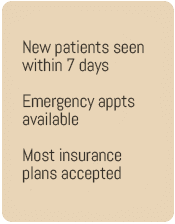Understanding Shingles Treatment and Prevention
Shingles is a virus that usually arises with a painful skin rash. One-third of the U.S. population will develop shingles sometime during their life, the Centers for Disease Control reports. While most people who get shingles will only have it one time, it can reoccur.
Shingles, also known as herpes zoster, was once thought to only affect people over the age of 50. In recent years, however, doctors and hospitals have been reporting an increase in shingles cases in younger patients.
In this blog, our primary care physicians offer patients advice and information about shingles treatment and prevention.
What causes shingles and why is it concerning?
Shingles is caused by the same virus that causes chickenpox, the varicella-zoster virus (VZV). The itchy, blistering rash was a common virus among children before the chickenpox vaccine was available.
Once you have had chickenpox, the VZV virus stays in your body and can reactivate later in life, causing shingles. Therefore, anyone who had chickenpox when they were younger is at risk of developing shingles as an adult. Individuals with a weak immune system are most susceptible to shingles. Mental or emotional stress can also trigger the virus.
Shingles often presents with postherpetic neuralgia (PHN), a severe nerve pain. Sometimes the pain lasts for weeks or even months. In extreme cases, patients can experience nerve pain for years after the shingles rash is gone.
Shingles is a concern not only because it is painful but also because it is highly contagious. Even someone who has never had chickenpox or the chickenpox vaccine can still get shingles from someone who has it.
An upset stomach, headaches and chills are also common symptoms of shingles. A less common complication of shingles is serious eye complications, including vision loss. Lung infections, hearing problems and brain inflammation can also occur with severe cases of shingles.
More young people are getting shingles
As a condition associated with immune deficiency, shingles is most common in adults 50 years and older. However, it is becoming more prevalent among younger people. Medical experts report these factors contributing to a higher incidence of shingles among young people:
- Stress
- Depression
- Chronic fatigue
- Chronic illnesses
- Prolonged use of steroids or immunosuppressive medications
What does the shingles rash look like?
Painful or itchy skin is the first sign of shingles, sometimes even before a rash appears. The rash typically appears as a single stripe or patch on one side of the body, but it can also appear on the face. The shingles rash can also look similar to chickenpox, with small blisters all over the body, but this is less common.
Shingles treatment and diagnosis
If you think you may have shingles, see your primary care doctor right away. He or she will perform a visual exam and ask questions about your symptoms. If you have blisters, your doctor may take a fluid sample to examine in a laboratory.
If you are diagnosed with shingles, your doctor will likely prescribe an antiviral medication. Acyclovir, famciclovir and valacyclovir are the most commonly prescribed antivirals for shingles treatment. The medication will help reduce the rash and other symptoms.
Your doctor may also suggest ibuprofen, acetaminophen or another over-the-counter pain reliever to address acute pain.
Vaccine for shingles prevention
Now that you know the causes, symptoms and treatment for shingles, you may want to take precautions to reduce your risk. Fortunately, there is a shingles vaccine.
For adults over age 50, the CDC recommends two doses of the shingles vaccine. RZV and Shingrix are the brand names for the recombinant zoster vaccine. For younger people with weakened immune systems, ask your doctor if you are a good candidate for the vaccine.
See your doctor for shingles treatment
If you have a rash that may be shingles, contact our practice immediately to make an appointment. Early detection leads to rapid shingles treatment, reducing the potential for spreading the virus or developing long-term complications.





